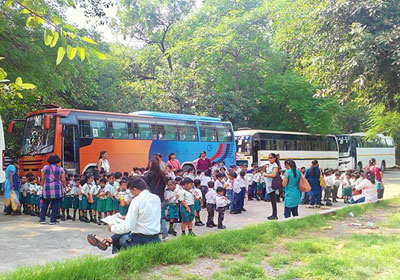జాతీయ జంతుసంరక్షణాలయం (నేషనల్ జూ పార్క్)
హుమయూన్ సమాధి మరియు పురానా ఖిల్లా మధ్యభాగంలో ఉన్న ఈ జూపార్క్ 1959 సం.ల 1 నవంబర్ న జూ పార్క్ పంజాబ్ రావ్ దేశ్ ముఖ్ , కేబినెట్ మంత్రి గారిచే ప్రారంభించబడినది. ఇందులో పులులు, చిరుతలు, ఎలుగు బంట్లు, కోతులు, జింకలు, హిప్పోపోటమస్, చింపాంజీలు, ఆఫ్రికన్ ఎద్దులు,మజిరాఫీలు, జీబ్రాలు, హైనాలు, గిర్ జాతి సింహాలు, బెంగాల్ టైగర్స్, ఇండియా ఖడ్గమృగాలు ఇంకా రకాల పక్షులు ఇంకా రకరకాల జంతువులు కలవు. జూ పార్క్ మొత్తం విస్తీర్ణం 176 ఎకరాలు. బ్యాటరీతో నడిపే కారు అద్దెకు తీసుకొనవచ్చు. జూపార్క్ లోనికి బయటనుండి తెచ్చుకున్న ఆహారపదార్థాలు అనుమతించబడవు. మంచినీరు మాత్రం తీసుకు వెళ్ళవచ్చు.పసిపిల్లలకు పాలు తీసుకు వెళ్ళవచ్చు. కెమేరాలు, ప్రమాదకర వస్తువులు, మ్యూజికల్ పరికరాలు, బ్యాగులు, పోలిధిన్ సంచులు అనుమతించబడవు.
National Zoological Park
The Indian Board for Wildlife felt in the year 1952 to have a zoo in the national capital of the
country to provide recreation to people at large. Accordingly, an ad-hoc committee of some
prominent nature lovers of Delhi, including Smt. Indira Gandhi, was constituted under the
Chairmanship of Chief Commissioner to formulate a proposal for establishment of Zoological
Park for Delhi. Mr M.E.F.Bowring Welsh, of the Society for Prevention of Cruelty to Animals,
was appointed as its Secretary. The committee met on 9th September, 1953 and approved the site
between Purana Quila and Humayun's Tomb for the purpose. It was also decided that the Central
Government will develop the park and hand it over in running condition to the Delhi Government
since wildlife was managed by Forest Department of the Delhi Government. An official from Indian
Forest Service Mr. N.D.Bachkheti was assigned the duty on 1st October 1955 to setup this Zoo.
Major Weinmann, Director of the Ceylon Zoological Garden, Colombo was invited to help draw a co-ordinated plan for development of the Park. He submitted a report alongwith a preliminary plan. As he was not available for continued consultations, it was decided to procure the services of Mr Carl Hagenbeck, owner of the famous Animal Park at Hamburg, West Germany, who gave the idea of open moat enclosures.
He presented a preliminary report in March 1956 and provided a general layout plan of waterways,
roads & paths, animal enclosures and sewage system. The plans were amended in the light of Ceylon
Zoological Garden local conditions and topography of the ground. The Government of India approved
this amended plan on 31st December, 1956.
By the end of 1959, construction had sufficiently advanced. The roads, waterways, moats, ponds and
animal houses had been constructed over the Northern half of the area, lawns laid and plantation
done. With the announcement of establishment of a Zoological Park at Delhi, gifts of animals started
coming from State Government and individuals. They were kept in temporary enclosures around Azimganj
Sarai, an enclosed square courtyard built for temporary halt for travellers during the Mughal days.
The collection comprising of Tigers, Leopards, Bears, Foxes, Monkeys, Deer, Antelope and many birds
were finally transferred to their permanent enclosures. The Park was formally inaugurated on 1st
November, 1959 by Mr Punjab Rao Deshmukh, Hon'ble Minister of the Government of India. This Park
was initially known as Delhi Zoo. In the year 1982 it was given the status of the National Zoological
Park with the idea of it being the model zoo of the country. ,/br>
Here at the National Zoological Park, birds and animals live in an environment that in many ways
resemble their natural habitat. The National Zoological Park not only provides a home for endangered
species, but also helps them to breed in captivity. Eventually they may once again thrive in the wild.
For full details please visit official websites : http://nzpnewdelhi.gov.in



